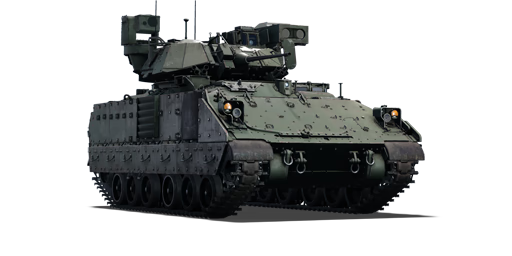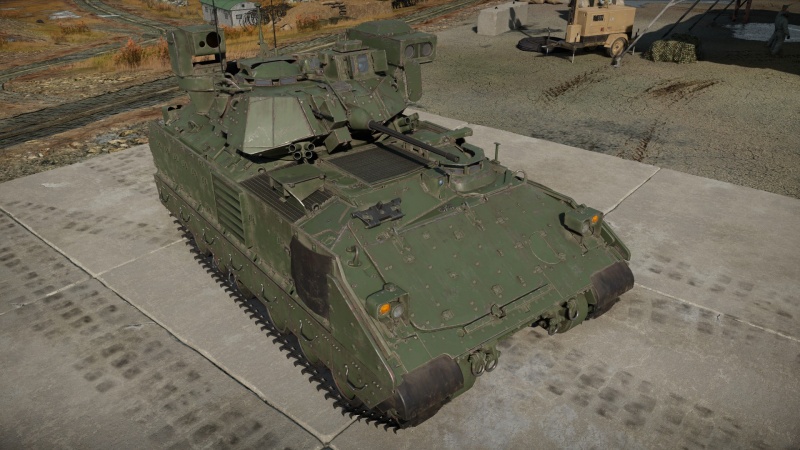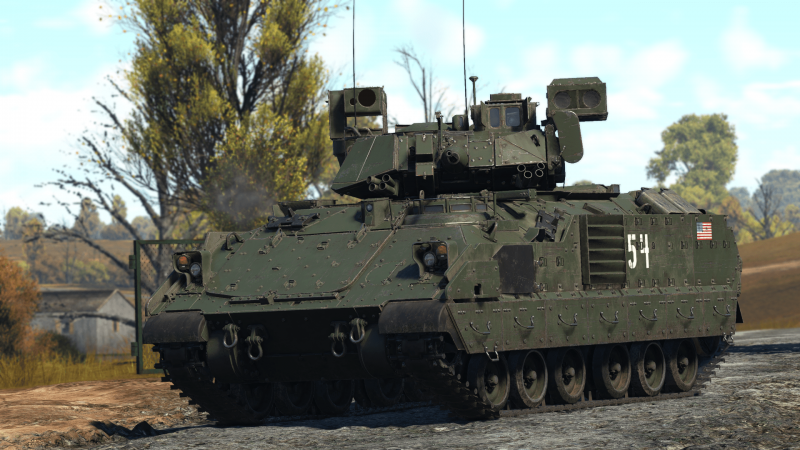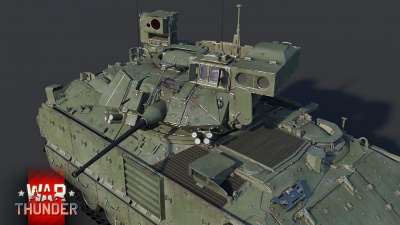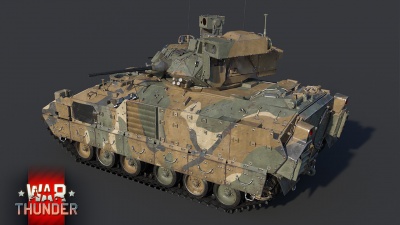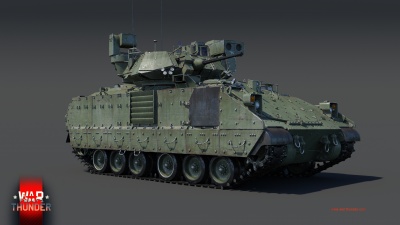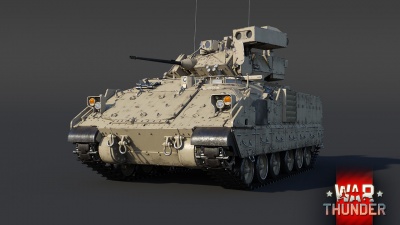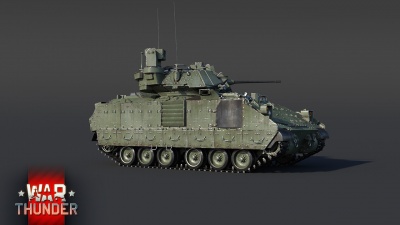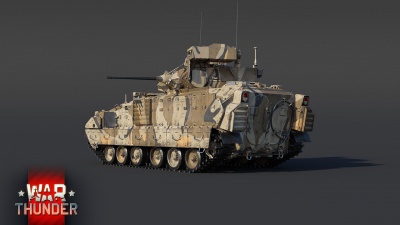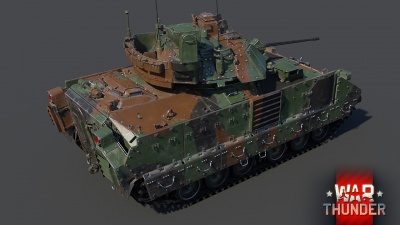Difference between revisions of "M3A3 Bradley"
m (→Pros and cons) (Tag: Visual edit) |
U137328340 (talk | contribs) m (Hate to be like an annoying English teacher, but I've gone and fixed up a lot of the phrasing and grammar of the Gameplay Section) (Tag: Visual edit) |
||
| (41 intermediate revisions by 15 users not shown) | |||
| Line 1: | Line 1: | ||
| + | {{About | ||
| + | | about = American light tank '''{{PAGENAME}}''' | ||
| + | | usage = the other version | ||
| + | | link = M3 Bradley | ||
| + | }} | ||
{{Specs-Card | {{Specs-Card | ||
|code=us_m3a3_bradley | |code=us_m3a3_bradley | ||
| − | |images={{Specs-Card-Image|GarageImage_{{PAGENAME}}.jpg}} | + | |images={{Specs-Card-Image|GarageImage_{{PAGENAME}}.jpg|ArtImage_{{PAGENAME}}.png}} |
}} | }} | ||
== Description == | == Description == | ||
<!-- ''In the description, the first part should be about the history of the creation and combat usage of the vehicle, as well as its key features. In the second part, tell the reader about the ground vehicle in the game. Insert a screenshot of the vehicle, so that if the novice player does not remember the vehicle by name, he will immediately understand what kind of vehicle the article is talking about.'' --> | <!-- ''In the description, the first part should be about the history of the creation and combat usage of the vehicle, as well as its key features. In the second part, tell the reader about the ground vehicle in the game. Insert a screenshot of the vehicle, so that if the novice player does not remember the vehicle by name, he will immediately understand what kind of vehicle the article is talking about.'' --> | ||
| − | The '''{{Specs|name}}''' | + | Since its adoption, the Bradley Fighting Vehicle (BFV) series have underwent design upgrades to accommodate new features and experiences, leading to the A1 and A2 variants that were deployed during Operation Desert Storm. As the US Army moved towards the 21st century, there was an emphasis in improving the crew's ability to obtain and transmit information as part of the overall digitization of the military. This led to the A3 variant in the late 1990s that saw introduction of new communication equipment to other vehicles, a Commander's Independent Thermal View (CITV), new fire control system, and GPS navigation. The A3 upgrade began full-rate production in 2001, which included the M3 BFV as the M3A3 BFV. |
| + | |||
| + | The '''{{Specs|name}}''', introduced in [[Update "Ixwa Strike"]], features significant capability improvements over the preceding [[M3 Bradley|M3 BFV]]. The M3A3 ability to engage targets have improved with a laser rangefinder, which complements well with the new 25 mm APFSDS ammunition available. The TOW missiles available for the M3A3 are also improved with the addition of the TOW-2A and TOW-2B modifications. The M3A3 variant differs mainly from the M3 Bradley by its laser rangefinder, its APFSDS belt for the 25 mm cannon, CITV, and more powerful TOW missiles with the TOW-2 penetrating almost double of the preceding version and the TOW-2B capable of top-attack. Though the armour is slightly better than the M3 with additional armour plates around the hull and sides, the M3A3 is still vulnerable to most enemy fire from autocannon calibre and above. Due to the new additions increasing the weight, the mobility is a little slower, though still respectable enough to get around. Despite these drawbacks, the vast firepower improvements ensure that the M3A3 remains competitive against its opponents. | ||
== General info == | == General info == | ||
| Line 12: | Line 19: | ||
{{Specs-Tank-Armour}} | {{Specs-Tank-Armour}} | ||
<!-- ''Describe armour protection. Note the most well protected and key weak areas. Appreciate the layout of modules as well as the number and location of crew members. Is the level of armour protection sufficient, is the placement of modules helpful for survival in combat? If necessary use a visual template to indicate the most secure and weak zones of the armour.'' --> | <!-- ''Describe armour protection. Note the most well protected and key weak areas. Appreciate the layout of modules as well as the number and location of crew members. Is the level of armour protection sufficient, is the placement of modules helpful for survival in combat? If necessary use a visual template to indicate the most secure and weak zones of the armour.'' --> | ||
| − | + | The armour on the M3A3 is significantly upgraded compared to its predecessor, with additional armour plates all around the vehicle. These armour plates make the M3A3 almost impervious to heavy machine guns such as the M2HB and the DShK. However, any weapon that is about 14.5 mm in diameter or larger (i.e. SPAA, [[Leopard 2K]], etc.) still poses a significant threat. As such, it is better to avoid taking hits when possible. | |
| + | |||
| + | Ammo is stored in large amounts throughout the tank, with 25 mm ammo containers lining the left side of the interior and additional BGM-71 ATGMs stowed on the right side. The loaded ammunition is stored just behind the turret crew, with a linked belt leading upwards into the breech. Penetrating hits that strike any of these ammunition stores have a high chance of setting the ammo off. | ||
| + | |||
| + | The engine, radiator, and transmission are positioned in the front of the tank, right side of the hull. These components can occasionally absorb hits from smaller calibre weaponry. | ||
'''Armour type:''' <!-- The types of armour present on the vehicle and their general locations --> | '''Armour type:''' <!-- The types of armour present on the vehicle and their general locations --> | ||
| Line 37: | Line 48: | ||
<!-- ''Write about the mobility of the ground vehicle. Estimate the specific power and manoeuvrability, as well as the maximum speed forwards and backwards.'' --> | <!-- ''Write about the mobility of the ground vehicle. Estimate the specific power and manoeuvrability, as well as the maximum speed forwards and backwards.'' --> | ||
| − | {{tankMobility|abMinHp= | + | {{tankMobility|abMinHp=930|rbMinHp=531}} |
=== Modifications and economy === | === Modifications and economy === | ||
{{Specs-Economy}} | {{Specs-Economy}} | ||
| + | |||
| + | '''<big>Unlock order recommendations</big>''' | ||
| + | |||
| + | The order of modifications should be well thought out. Below is a guide of which modifications to unlock first, but it is just a recommendation and can be modified or adapted depending on the tank commander's preferences. | ||
| + | |||
| + | '''Tier 1''' | ||
| + | |||
| + | For tier 1, only one modification is needed to progress to the next tier so it is recommended to just stick with parts as the first modification because it allows you to repair your tank in battle and also is very cheap, allowing you to move on to tier 2 very quickly. | ||
| + | |||
| + | '''Tier 2''' | ||
| + | |||
| + | At tier 2, it is recommended to research NVD in order to allow for easy spotting of enemies in battle so that the M3A3 can survive longer and also get more kills (also making night battles viable). Alternatively, FPE can be researched before NVD in order to prevent the first two fires from knocking the M3A3 out of battle. After both of those modifications are unlocked one more is needed before you can progress to tier 3. Adjustment of fire is a good choice here but none of the remaining modifications (Suspension, Brake system, Airstrike) will make a huge difference so it is up to the vehicle commander. | ||
| + | |||
| + | '''Tier 3''' | ||
| + | |||
| + | Once tier 3 is unlocked, the priority should be either Smoke grenades or TOW-2B depending on if the commander would rather have a chance of hiding his vehicle or would rather have a better weapon. The third modification from this tier that should be unlocked is either Filters in order to improve the mobility or Crew replenishment. | ||
| + | |||
| + | '''Tier 4''' | ||
| + | |||
| + | Moving on to tier 4, the commander can pick either the Engine mod or the APFSDS modification depending on whether improved mobility or firepower is preferred. | ||
| + | |||
| + | '''Finishing up''' | ||
| + | |||
| + | After those two are unlocked, the commander can pick whatever other modifications he/she wants as the remaining mods from all tiers are more minor than the ones that were prioritized. Tracks, transmission, laser rangefinder, horizontal drive, crew replenishment/filters (whichever wasn't chosen before), and ESS are all good modifications that can make a noticeable impact on the battle. The rest - suspension, brake system, airstrike, and the APDS belts - are all minor modifications that will not make much of a difference in battle and as such should be saved for last, in the order chosen by the commander. | ||
== Armaments == | == Armaments == | ||
| Line 71: | Line 106: | ||
* '''M919:''' {{Annotation|APFSDS|Armour-piercing fin-stabilized discarding sabot}} | * '''M919:''' {{Annotation|APFSDS|Armour-piercing fin-stabilized discarding sabot}} | ||
| − | + | The belt of 25 mm APFSDS shells excels against lightly-armoured vehicles and has a more consistent performance against the sides of armoured enemy MBTs than the M3 Bradley's mixed APDS/HEI-T belt. | |
| − | + | ||
| − | + | {{:M242 (25 mm)/Ammunition|APDS, HEI-T*, APFSDS}} | |
| − | |||
| − | |||
| − | |||
| − | |||
| − | |||
| − | |||
| − | |||
| − | |||
| − | |||
| − | |||
| − | |||
| − | |||
| − | { | ||
| − | |||
| − | |||
| − | |||
| − | |||
| − | |||
| − | |||
| − | |||
| − | |||
| − | |||
| − | |||
| − | |- | ||
| − | |||
| − | |||
| − | |||
| − | |||
| − | |||
==== [[Ammo racks]] ==== | ==== [[Ammo racks]] ==== | ||
| Line 126: | Line 132: | ||
<!-- ''Some tanks are armed with several guns in one or more turrets. Evaluate the additional weaponry and give advice on its use. Describe the ammunition available for additional weaponry. Give advice on about how to use them and how to fill the ammunition storage. If there is no additional weaponry remove this subsection.'' --> | <!-- ''Some tanks are armed with several guns in one or more turrets. Evaluate the additional weaponry and give advice on its use. Describe the ammunition available for additional weaponry. Give advice on about how to use them and how to fill the ammunition storage. If there is no additional weaponry remove this subsection.'' --> | ||
{{main|BGM-71 TOW}} | {{main|BGM-71 TOW}} | ||
| − | |||
{| class="wikitable" style="text-align:center" width="100%" | {| class="wikitable" style="text-align:center" width="100%" | ||
| Line 136: | Line 141: | ||
|- | |- | ||
| 12 (2) || -19°/+29° || N/A || N/A || _.__ || _.__ || _.__ || _.__ | | 12 (2) || -19°/+29° || N/A || N/A || _.__ || _.__ || _.__ || _.__ | ||
| − | |||
|- | |- | ||
|} | |} | ||
==== Ammunition ==== | ==== Ammunition ==== | ||
| − | { | + | {{:BGM-71 TOW/Ammunition|TOW-2, TOW-2B}} |
| − | |||
| − | |||
| − | |||
| − | |||
| − | |||
| − | |||
| − | |||
| − | |||
| − | |||
| − | |||
| − | |||
| − | |||
| − | |||
| − | |||
| − | |||
| − | |||
| − | |||
| − | |||
| − | |||
| − | |||
| − | |||
| − | |||
| − | |||
| − | |||
| − | |||
| − | |||
| − | |||
| − | | TOW-2 | ||
| − | |||
| − | |||
| − | |||
| − | |||
==== [[Ammo racks]] ==== | ==== [[Ammo racks]] ==== | ||
| Line 210: | Line 182: | ||
== Usage in battles == | == Usage in battles == | ||
<!-- ''Describe the tactics of playing in the vehicle, the features of using vehicles in the team and advice on tactics. Refrain from creating a "guide" - do not impose a single point of view but instead give the reader food for thought. Describe the most dangerous enemies and give recommendations on fighting them. If necessary, note the specifics of the game in different modes (AB, RB, SB).'' --> | <!-- ''Describe the tactics of playing in the vehicle, the features of using vehicles in the team and advice on tactics. Refrain from creating a "guide" - do not impose a single point of view but instead give the reader food for thought. Describe the most dangerous enemies and give recommendations on fighting them. If necessary, note the specifics of the game in different modes (AB, RB, SB).'' --> | ||
| − | + | The primary role of the M3A3 in battles is to be a support vehicle. Because the secondary missile launcher deploys only when the vehicle is at a slow speed, the gameplay should be slower and further away from the frontlines of the battlefield. The TOW-2B modification is highly recommended as it allows the player to easily compromise enemy sniper positions using their top-attack effect. The vehicle's scouting ability should also be used on enemies in tough positions or distant targets. A secondary use for the vehicle is in more close-quarters maps as a flanker because the 25 mm cannon can easily penetrate the sides and rear of enemy tanks. Regarding survivability, even though the M3A3 has add-on armour unlike its predecessor, the M3 Bradley still doesn't have enough armour to defend against most threats. This makes the vehicle very vulnerable, a fact which should be kept in mind at all times whilst playing the M3 Bradley. | |
| + | |||
| + | '''Stock grind''' | ||
| + | |||
| + | Gameplay-wise, the Bradley's stock experience does not differ as much from its spaded form, unlike many other vehicles. Albeit, it is missing many abilities such as TOW-2B missiles, smoke grenades and ESS, or engine horsepower to name a few. But, the stock vehicle is still very deadly on the battlefield and can be useful to the team. First of all, the stock M3A3 should not be played near the frontlines as it cannot fire missiles on the move and also the APDS rounds in the stock 25 mm belt will not penetrate anything heavier than a light vehicle from the front. It should be played towards the rear behind friendly tanks, scouting and supporting them with 25 mm rounds and missiles as needed. The TOW-2 missiles that come stock are great at knocking out tanks from the front, even ones that have ERA. The goal is to not be shot by the enemy but to get assists with the 25 mm gun and kills with the missiles while scouting targets for the team. If possible, flanking routes or long range hull-down sniping are also recommended to try and prevent the tank being hit by enemy fire. In summary, a much more cautious approach should be taken to prevent destruction by enemies and gain RP by getting assists and kills by supporting teammates. | ||
=== Pros and cons === | === Pros and cons === | ||
| Line 217: | Line 193: | ||
'''Pros:''' | '''Pros:''' | ||
| − | * Access to a full belt of 25 mm APFSDS shells - | + | * Access to a full belt of 25 mm APFSDS shells - excels against light vehicles and lightly-armoured MBTs |
* Access to the fast travelling TOW-2B top-attack missile - capable of penetrating the weak top armour of enemy tanks, and targeting vehicles that are hiding behind cover | * Access to the fast travelling TOW-2B top-attack missile - capable of penetrating the weak top armour of enemy tanks, and targeting vehicles that are hiding behind cover | ||
| − | * | + | * 2nd generation thermals for the gunner, commander, and even the driver allow for excellent spotting and scouting of targets along with the scout UAV |
| − | * | + | * Elevated independent commander sight which allows TOW missiles to be fired and accurately guided from behind cover |
| − | + | * Good mobility and respectable reverse speed of -13 km/h | |
| − | + | * Can engage enemy aerial vehicles with the main gun due to +59° of gun elevation and IRST with roughly 8 km range | |
| − | + | ** Does not trigger enemy RWRs when locked on | |
| − | * Can engage enemy aerial vehicles with the main gun due to + | + | * -9° gun depression and a small turret mean you can effectively use hull down tactics |
| − | * - | + | * Laser rangefinder for the main gun unlike the preceding [[M3 Bradley]] |
| − | * Laser rangefinder for the main gun | + | * Great zoom of 4.0x - 12.0x and a good sight FOV of 18°-6° |
| − | * Great zoom of 4.0x - 12.0x and a good sight FOV of | + | * Can absorb up to 30 mm APDS (as fired by, for example, the BMP-2) in some places at range |
| − | * | + | * Quick gun handling like its predecessor |
| − | |||
| − | * Quick | ||
| − | |||
| − | |||
'''Cons:''' | '''Cons:''' | ||
| − | * Slightly less mobile and less | + | * Slightly less mobile and less acceleration than the preceding [[M3 Bradley]], due to the increase in weight |
* Continuously firing the main gun increases dispersion, thereby reducing accuracy | * Continuously firing the main gun increases dispersion, thereby reducing accuracy | ||
| − | * Low rate | + | * Low fire rate for the main gun makes it difficult to land hits on fast moving aircraft |
| − | * Cannot fire missiles while moving at a speed greater than | + | * Cannot reliably engage distant air targets due to lack of range |
| − | * Missile | + | * Cannot fire missiles while moving at a speed greater than 15 km/h |
| − | * Cannot reliably engage enemy MBTs from the front with 25 mm APFSDS | + | * Missile launcher takes some time to deploy |
| − | * | + | * TOW-2Bs are very inconsistent in terms of damage and can be stopped by ERA |
| − | + | * Cannot reliably engage enemy MBTs from the front with 25 mm APFSDS rounds | |
| + | * Retains the rather poor survivability of its predecessor despite the increase in armour | ||
* Missiles can be detonated when hit by enemy fire, even while still in the launcher | * Missiles can be detonated when hit by enemy fire, even while still in the launcher | ||
* Tall profile | * Tall profile | ||
| − | |||
== History == | == History == | ||
| Line 258: | Line 230: | ||
<!-- ''Excellent additions to the article would be video guides, screenshots from the game, and photos.'' --> | <!-- ''Excellent additions to the article would be video guides, screenshots from the game, and photos.'' --> | ||
| + | ;Skins | ||
| + | |||
| + | * [https://live.warthunder.com/feed/camouflages/?vehicle=us_m3a3_bradley Skins and camouflages for the {{PAGENAME}} from live.warthunder.com.] | ||
| + | |||
| + | ;Images | ||
<gallery mode="packed" heights="150"> | <gallery mode="packed" heights="150"> | ||
File:M3A3 Bradley WTWallpaper 01.jpg| | File:M3A3 Bradley WTWallpaper 01.jpg| | ||
| Line 267: | Line 244: | ||
File:M3A3 Bradley WTWallpaper 07.jpg| | File:M3A3 Bradley WTWallpaper 07.jpg| | ||
</gallery> | </gallery> | ||
| + | |||
| + | ;Videos | ||
| + | {{Youtube-gallery|EqBcQom4ilU|'''M3(A3) Bradley Ultimate Review''' - ''Bob Dickinson''|klTnC5qwPX4|'''The Shooting Range #248''' - ''Metal Beasts'' section at 00:29 discusses the {{PAGENAME}}.}} | ||
== See also == | == See also == | ||
| Line 272: | Line 252: | ||
* ''reference to the series of the vehicles;'' | * ''reference to the series of the vehicles;'' | ||
* ''links to approximate analogues of other nations and research trees.'' --> | * ''links to approximate analogues of other nations and research trees.'' --> | ||
| − | |||
| − | * | + | ;Other vehicles of similar configuration and role |
| − | * | + | |
| + | * [[Khrizantema-S]] | ||
| + | * [[Strf 9040 BILL]] | ||
| + | * [[Dardo]] | ||
| + | * [[VCC-80/30]] | ||
== External links == | == External links == | ||
| Line 281: | Line 264: | ||
* ''topic on the official game forum;'' | * ''topic on the official game forum;'' | ||
* ''other literature.'' --> | * ''other literature.'' --> | ||
| − | |||
| − | * | + | * [[wt:en/news/7048-development-m3a3-bradley-the-upgraded-warhorse-en|[Devblog] M3A3 Bradley: The Upgraded Warhorse]] |
| − | |||
| + | {{TankManufacturer FMC}} | ||
{{USA light tanks}} | {{USA light tanks}} | ||
| + | |||
[[Category:ATGM vehicles]] | [[Category:ATGM vehicles]] | ||
Latest revision as of 21:42, 31 July 2024
| This page is about the American light tank M3A3 Bradley. For the other version, see M3 Bradley. |
Contents
Description
Since its adoption, the Bradley Fighting Vehicle (BFV) series have underwent design upgrades to accommodate new features and experiences, leading to the A1 and A2 variants that were deployed during Operation Desert Storm. As the US Army moved towards the 21st century, there was an emphasis in improving the crew's ability to obtain and transmit information as part of the overall digitization of the military. This led to the A3 variant in the late 1990s that saw introduction of new communication equipment to other vehicles, a Commander's Independent Thermal View (CITV), new fire control system, and GPS navigation. The A3 upgrade began full-rate production in 2001, which included the M3 BFV as the M3A3 BFV.
The Fighting Vehicle, Cavalry, M3A3, introduced in Update "Ixwa Strike", features significant capability improvements over the preceding M3 BFV. The M3A3 ability to engage targets have improved with a laser rangefinder, which complements well with the new 25 mm APFSDS ammunition available. The TOW missiles available for the M3A3 are also improved with the addition of the TOW-2A and TOW-2B modifications. The M3A3 variant differs mainly from the M3 Bradley by its laser rangefinder, its APFSDS belt for the 25 mm cannon, CITV, and more powerful TOW missiles with the TOW-2 penetrating almost double of the preceding version and the TOW-2B capable of top-attack. Though the armour is slightly better than the M3 with additional armour plates around the hull and sides, the M3A3 is still vulnerable to most enemy fire from autocannon calibre and above. Due to the new additions increasing the weight, the mobility is a little slower, though still respectable enough to get around. Despite these drawbacks, the vast firepower improvements ensure that the M3A3 remains competitive against its opponents.
General info
Survivability and armour
The armour on the M3A3 is significantly upgraded compared to its predecessor, with additional armour plates all around the vehicle. These armour plates make the M3A3 almost impervious to heavy machine guns such as the M2HB and the DShK. However, any weapon that is about 14.5 mm in diameter or larger (i.e. SPAA, Leopard 2K, etc.) still poses a significant threat. As such, it is better to avoid taking hits when possible.
Ammo is stored in large amounts throughout the tank, with 25 mm ammo containers lining the left side of the interior and additional BGM-71 ATGMs stowed on the right side. The loaded ammunition is stored just behind the turret crew, with a linked belt leading upwards into the breech. Penetrating hits that strike any of these ammunition stores have a high chance of setting the ammo off.
The engine, radiator, and transmission are positioned in the front of the tank, right side of the hull. These components can occasionally absorb hits from smaller calibre weaponry.
Armour type:
| Armour | Front (Slope angle) | Sides | Rear | Roof |
|---|---|---|---|---|
| Hull | ___ mm | ___ mm Top ___ mm Bottom |
___ mm | ___ - ___ mm |
| Turret | ___ - ___ mm Turret front ___ mm Gun mantlet |
___ - ___ mm | ___ - ___ mm | ___ - ___ mm |
| Cupola | ___ mm | ___ mm | ___ mm | ___ mm |
Notes:
Mobility
| Game Mode | Max Speed (km/h) | Weight (tons) | Engine power (horsepower) | Power-to-weight ratio (hp/ton) | |||
|---|---|---|---|---|---|---|---|
| Forward | Reverse | Stock | Upgraded | Stock | Upgraded | ||
| Arcade | Expression error: Unexpected * operator. | 930 | Expression error: Unexpected round operator. | __.__ | |||
| Realistic | 531 | Expression error: Unexpected round operator. | __.__ | ||||
Modifications and economy
Unlock order recommendations
The order of modifications should be well thought out. Below is a guide of which modifications to unlock first, but it is just a recommendation and can be modified or adapted depending on the tank commander's preferences.
Tier 1
For tier 1, only one modification is needed to progress to the next tier so it is recommended to just stick with parts as the first modification because it allows you to repair your tank in battle and also is very cheap, allowing you to move on to tier 2 very quickly.
Tier 2
At tier 2, it is recommended to research NVD in order to allow for easy spotting of enemies in battle so that the M3A3 can survive longer and also get more kills (also making night battles viable). Alternatively, FPE can be researched before NVD in order to prevent the first two fires from knocking the M3A3 out of battle. After both of those modifications are unlocked one more is needed before you can progress to tier 3. Adjustment of fire is a good choice here but none of the remaining modifications (Suspension, Brake system, Airstrike) will make a huge difference so it is up to the vehicle commander.
Tier 3
Once tier 3 is unlocked, the priority should be either Smoke grenades or TOW-2B depending on if the commander would rather have a chance of hiding his vehicle or would rather have a better weapon. The third modification from this tier that should be unlocked is either Filters in order to improve the mobility or Crew replenishment.
Tier 4
Moving on to tier 4, the commander can pick either the Engine mod or the APFSDS modification depending on whether improved mobility or firepower is preferred.
Finishing up
After those two are unlocked, the commander can pick whatever other modifications he/she wants as the remaining mods from all tiers are more minor than the ones that were prioritized. Tracks, transmission, laser rangefinder, horizontal drive, crew replenishment/filters (whichever wasn't chosen before), and ESS are all good modifications that can make a noticeable impact on the battle. The rest - suspension, brake system, airstrike, and the APDS belts - are all minor modifications that will not make much of a difference in battle and as such should be saved for last, in the order chosen by the commander.
Armaments
Main armament
| 25 mm M242 | Turret rotation speed (°/s) | Reloading rate (seconds) | ||||||||||||
|---|---|---|---|---|---|---|---|---|---|---|---|---|---|---|
| Mode | Capacity (Belt) | Fire rate | Vertical | Horizontal | Stabilizer | Stock | Upgraded | Full | Expert | Aced | Stock | Full | Expert | Aced |
| Arcade | 1,500 (300) | 201 | -9°/+59° | ±180° | Two-plane | 57.1 | 79.1 | 96.0 | 106.2 | 112.9 | 0.26 | 0.23 | 0.21 | 0.20 |
| Realistic | 35.7 | 42.0 | 51.0 | 56.4 | 60.0 | |||||||||
Ammunition
- Default: APDS · HEI-T*
- M791: APDS · APDS · APDS · HEI-T*
- M919: APFSDS
The belt of 25 mm APFSDS shells excels against lightly-armoured vehicles and has a more consistent performance against the sides of armoured enemy MBTs than the M3 Bradley's mixed APDS/HEI-T belt.
| Penetration statistics | |||||||
|---|---|---|---|---|---|---|---|
| Ammunition | Penetration @ 0° Angle of Attack (mm) | ||||||
| 10 m | 100 m | 500 m | 1,000 m | 1,500 m | 2,000 m | ||
| APDS | 81 | 80 | 74 | 67 | 61 | 56 | |
| HEI-T* | 7 | 6 | 4 | 3 | 3 | 3 | |
| APFSDS | 101 | 100 | 95 | 88 | 81 | 74 | |
| Shell details | ||||||||||||
|---|---|---|---|---|---|---|---|---|---|---|---|---|
| Ammunition | Velocity (m/s) |
Projectile mass (kg) |
Fuse delay (m) |
Fuse sensitivity (mm) |
Explosive mass (TNT equivalent) (g) |
Ricochet | ||||||
| 0% | 50% | 100% | ||||||||||
| APDS | 1,345 | 0.13 | - | - | - | 75° | 78° | 80° | ||||
| HEI-T* | 1,100 | 0.19 | 0.1 | 0.1 | 54.4 | 79° | 80° | 81° | ||||
| APFSDS | 1,385 | 0.1 | - | - | - | 78° | 80° | 81° | ||||
Ammo racks
| Full ammo |
1st rack empty |
2nd rack empty |
3rd rack empty |
4th rack empty |
5th rack empty |
6th rack empty |
Visual discrepancy |
|---|---|---|---|---|---|---|---|
| 5 | __ (+__) | __ (+__) | __ (+__) | __ (+__) | __ (+__) | __ (+__) | __ |
Additional armament
| BGM-71 TOW missile | Reloading rate (seconds) | ||||||
|---|---|---|---|---|---|---|---|
| Capacity (Belt) | Vertical | Horizontal | Stabilizer | Stock | Full | Expert | Aced |
| 12 (2) | -19°/+29° | N/A | N/A | _.__ | _.__ | _.__ | _.__ |
Ammunition
| Penetration statistics | |||||||
|---|---|---|---|---|---|---|---|
| Ammunition | Type of warhead |
Penetration @ 0° Angle of Attack (mm) | |||||
| 10 m | 100 m | 500 m | 1,000 m | 1,500 m | 2,000 m | ||
| TOW-2 | ATGM | 800 | 800 | 800 | 800 | 800 | 800 |
| TOW-2B | ATGM (OTA) | 100 | 100 | 100 | 100 | 100 | 100 |
| Missile details | ||||||||||||
|---|---|---|---|---|---|---|---|---|---|---|---|---|
| Ammunition | Type of warhead |
Velocity (m/s) |
Range (m) |
Projectile mass (kg) |
Fuse delay (m) |
Fuse sensitivity (mm) |
Explosive mass (TNT equivalent) (kg) |
Ricochet | ||||
| 0% | 50% | 100% | ||||||||||
| TOW-2 | ATGM | 329 | 3,750 | 21.45 | 0.05 | 0.1 | 4.41 | 80° | 82° | 90° | ||
| Missile details | ||||||||||||
|---|---|---|---|---|---|---|---|---|---|---|---|---|
| Ammunition | Type of warhead |
Velocity (m/s) |
Range (m) |
Projectile mass (kg) |
Fuse delay (m) |
Fuse sensitivity (mm) |
Arming distance (m) |
Trigger radius (m) |
Explosive mass (TNT equivalent) (kg) |
Ricochet | ||
| 0% | 50% | 100% | ||||||||||
| TOW-2B | ATGM (OTA) | 309 | 3,750 | 22.59 | 0.05 | 0.1 | 30 | 3 | 3.38 | 80° | 82° | 90° |
Ammo racks
| Full ammo |
1st rack empty |
2nd rack empty |
3rd rack empty |
4th rack empty |
5th rack empty |
6th rack empty |
Visual discrepancy |
|---|---|---|---|---|---|---|---|
| 6 | __ (+__) | __ (+__) | __ (+__) | __ (+__) | __ (+__) | __ (+__) | __ |
Machine guns
| 7.62 mm M240 | ||||
|---|---|---|---|---|
| Mount | Capacity (Belt) | Fire rate | Vertical | Horizontal |
| Coaxial | 4,400 (200) | 941 | N/A | N/A |
Usage in battles
The primary role of the M3A3 in battles is to be a support vehicle. Because the secondary missile launcher deploys only when the vehicle is at a slow speed, the gameplay should be slower and further away from the frontlines of the battlefield. The TOW-2B modification is highly recommended as it allows the player to easily compromise enemy sniper positions using their top-attack effect. The vehicle's scouting ability should also be used on enemies in tough positions or distant targets. A secondary use for the vehicle is in more close-quarters maps as a flanker because the 25 mm cannon can easily penetrate the sides and rear of enemy tanks. Regarding survivability, even though the M3A3 has add-on armour unlike its predecessor, the M3 Bradley still doesn't have enough armour to defend against most threats. This makes the vehicle very vulnerable, a fact which should be kept in mind at all times whilst playing the M3 Bradley.
Stock grind
Gameplay-wise, the Bradley's stock experience does not differ as much from its spaded form, unlike many other vehicles. Albeit, it is missing many abilities such as TOW-2B missiles, smoke grenades and ESS, or engine horsepower to name a few. But, the stock vehicle is still very deadly on the battlefield and can be useful to the team. First of all, the stock M3A3 should not be played near the frontlines as it cannot fire missiles on the move and also the APDS rounds in the stock 25 mm belt will not penetrate anything heavier than a light vehicle from the front. It should be played towards the rear behind friendly tanks, scouting and supporting them with 25 mm rounds and missiles as needed. The TOW-2 missiles that come stock are great at knocking out tanks from the front, even ones that have ERA. The goal is to not be shot by the enemy but to get assists with the 25 mm gun and kills with the missiles while scouting targets for the team. If possible, flanking routes or long range hull-down sniping are also recommended to try and prevent the tank being hit by enemy fire. In summary, a much more cautious approach should be taken to prevent destruction by enemies and gain RP by getting assists and kills by supporting teammates.
Pros and cons
Pros:
- Access to a full belt of 25 mm APFSDS shells - excels against light vehicles and lightly-armoured MBTs
- Access to the fast travelling TOW-2B top-attack missile - capable of penetrating the weak top armour of enemy tanks, and targeting vehicles that are hiding behind cover
- 2nd generation thermals for the gunner, commander, and even the driver allow for excellent spotting and scouting of targets along with the scout UAV
- Elevated independent commander sight which allows TOW missiles to be fired and accurately guided from behind cover
- Good mobility and respectable reverse speed of -13 km/h
- Can engage enemy aerial vehicles with the main gun due to +59° of gun elevation and IRST with roughly 8 km range
- Does not trigger enemy RWRs when locked on
- -9° gun depression and a small turret mean you can effectively use hull down tactics
- Laser rangefinder for the main gun unlike the preceding M3 Bradley
- Great zoom of 4.0x - 12.0x and a good sight FOV of 18°-6°
- Can absorb up to 30 mm APDS (as fired by, for example, the BMP-2) in some places at range
- Quick gun handling like its predecessor
Cons:
- Slightly less mobile and less acceleration than the preceding M3 Bradley, due to the increase in weight
- Continuously firing the main gun increases dispersion, thereby reducing accuracy
- Low fire rate for the main gun makes it difficult to land hits on fast moving aircraft
- Cannot reliably engage distant air targets due to lack of range
- Cannot fire missiles while moving at a speed greater than 15 km/h
- Missile launcher takes some time to deploy
- TOW-2Bs are very inconsistent in terms of damage and can be stopped by ERA
- Cannot reliably engage enemy MBTs from the front with 25 mm APFSDS rounds
- Retains the rather poor survivability of its predecessor despite the increase in armour
- Missiles can be detonated when hit by enemy fire, even while still in the launcher
- Tall profile
History
Devblog
Following the Gulf War of the early 1990's, US engineers developed a new modification of the widely used M3 Bradley in order to incorporate improvements derived from the operational experience gained during the conflict. As such, the Bradley received numerous upgrades to its electronic systems, including a new fire control system, a laser rangefinder and thermal imaging for the commander along with other improvements to the vehicle's protection and firepower.
The M3A3 modification of the Bradley started being shipped to the first U.S. Army units in 1998 with the first vehicles officially entering service in 2000. By late 2010, well over 3,300 Bradleys were converted to the A3 standard and the vehicle continues serving as one of the cornerstones of the U.S. armored units today.
Media
- Skins
- Images
- Videos
See also
- Other vehicles of similar configuration and role
External links
| Food Machinery Corporation (FMC) | |
|---|---|
| Amphibious AFVs | LVT(A)(1) · LVT(A)(4) |
| IFVs | M3 Bradley · M3A3 Bradley |
| USA light tanks | |
|---|---|
| LVT | LVT(A)(1) · ○LVT(A)(1) · LVT(A)(4) |
| M2 | M2A2 · M2A4 · M2A4 (1st Arm.Div.) |
| M3/M5 Stuart | M3 Stuart · M3A1 Stuart · M3A1 (USMC) · M5A1 · M5A1 TD · ▃Stuart VI (5th CAD) |
| M22 Locust | M22 |
| M24 Chaffee | M24 · M24 (TL) |
| M18 Hellcat | M18 GMC · M18 "Black Cat" · Super Hellcat |
| M41 Walker Bulldog | M41A1 |
| M551 Sheridan | M551 · M551(76) |
| M3 Bradley | M3 Bradley · M3A3 Bradley |
| Wheeled | M8 LAC · T18E2 · M1128 · M1128 Wolfpack |
| Other | M8A1 GMC · T92 · T114 · HSTV-L · CCVL · XM8 · XM800T · AGS |


